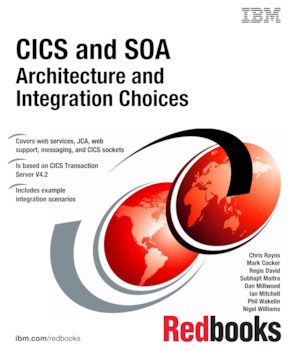Abstract
The service-oriented architecture (SOA) style of integration involves breaking an application down into common, repeatable services that can be used by other applications (both internal and external) in an organization, independent of the computing platforms on which the business and its partners rely.
In recent years CICS® has added a variety of support for SOA and now provides near seamless connectivity with other IT environments. This IBM® Redbooks® publication helps IT architects to select, plan, and design solutions that integrate CICS applications as service providers and requesters.
First, we provide an introduction to CICS service enablement and introduce the architectural choices and technologies on which a CICS SOA solution can be based.
We continue with an in-depth analysis of how to meet functional and non-functional requirements in the areas of application interface, security, transactional scope, high availability, and scalability.
Finally, we document three integration scenarios to illustrate how these technologies have been used by customers to build robust CICS integration solutions.
Table of Contents
Part 1. Architecture and technologies
Chapter 1. Introduction to Service Enablement for CICS
Chapter 2. Architectural choices
Chapter 3. Technology overview
Chapter 4. Reusing CICS applications with a 3270 presentation layer
Part 2. Qualities of service
Chapter 5. Application interfaces
Chapter 6. Security
Chapter 7. Transactional scope
Chapter 8. High availability and scalability
Part 3. Integration scenarios
Chapter 9. CICS Web services scenario
Chapter 10. CICS TG for z/OS scenario
Chapter 11. Messaging scenario
Part 4. Appendix
Appendix A. Product capabilities
